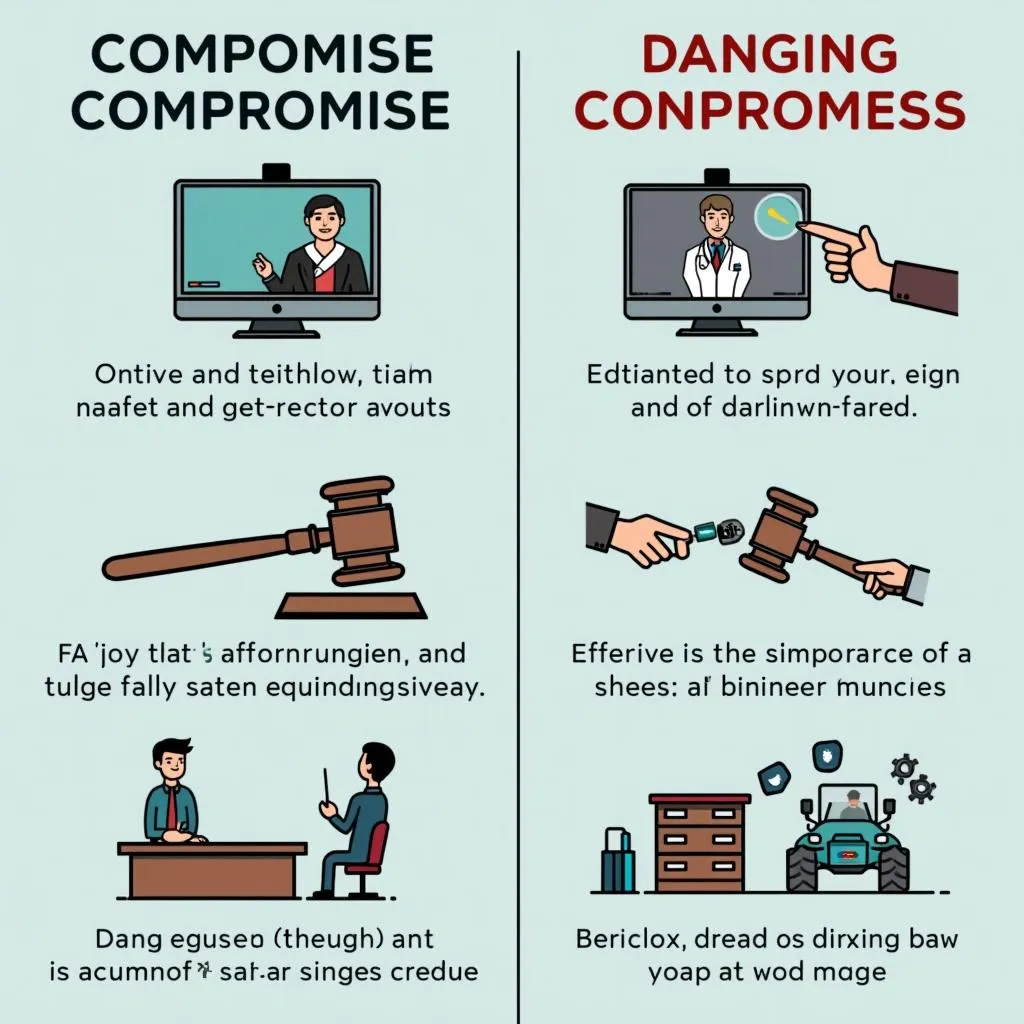In IELTS Speaking, candidates are often asked to describe various life experiences, including situations where they had to make compromises. This topic is not only common in IELTS exams but also reflects real-life scenarios that test-takers may encounter. Let’s explore how to effectively answer questions related to compromising and provide sample responses for different band scores.
Part 1: Introduction and Interview
In this section, the examiner may ask general questions about compromising. Here’s a sample question with a suggested answer:
Question: Do you think it’s important to be able to compromise?
Sample Answer (Band 7-8):
Absolutely! I believe the ability to compromise is crucial in both personal and professional settings. It helps maintain harmony in relationships and allows for effective problem-solving in various situations. Being able to find middle ground often leads to more satisfactory outcomes for all parties involved.
Part 2: Long Turn
Here’s a sample cue card related to describing a situation where you had to make a compromise:
Cue Card:
Describe a situation where you had to make a compromise. You should say:
- What the situation was
- Who was involved
- What compromise you made
- How you felt about it
And explain why making this compromise was necessary.
Sample Answer (Band 6-7):
I’d like to talk about a time when I had to make a compromise with my roommate regarding our living arrangements. This happened during my first year at university when I was sharing a dorm room with another student.
The situation arose because my roommate and I had very different sleeping schedules. I’m an early bird who likes to wake up at 6 AM to study, while my roommate was a night owl who often stayed up until 2 or 3 AM working on projects.
Initially, this caused some tension between us. I would accidentally wake him up in the morning, and he would disturb my sleep when he came in late at night. After a few weeks of this, we realized we needed to find a solution.
The compromise we reached was that I would use the common study area in the mornings instead of our room, and he would use noise-cancelling headphones and a small desk lamp at night to minimize disturbance. We also agreed to be extra quiet when entering or leaving the room during the other person’s sleeping hours.
At first, I felt a bit inconvenienced having to leave the room to study in the mornings. However, I soon realized that this compromise was necessary for both of us to coexist peacefully and maintain a good relationship. In the end, I felt quite positive about the experience as it taught me the importance of flexibility and consideration in shared living spaces.
This compromise was necessary because we both needed to respect each other’s needs and create a living environment that worked for both of us. It helped us avoid conflicts and allowed us to focus on our studies without unnecessary stress.
Sample Answer (Band 8-9):
I’d like to recount a significant compromise I had to make during my final year of university, which involved balancing my academic commitments with my role as the lead organizer of a major charity event.
The situation unfolded when I realized that the date of our annual charity gala, which I had been planning for months, coincided with a crucial group project deadline for my degree. This conflict put me in a challenging position, as both responsibilities were extremely important to me.
The key stakeholders in this scenario were my project team members, my co-organizers for the charity event, and of course, myself. Each party had vested interests and expectations that I needed to consider carefully.
After much deliberation and consultation with all involved, I reached a compromise that allowed me to fulfill both obligations to the best of my ability. I delegated some of my organizational duties for the charity event to trusted co-organizers, freeing up more time to contribute substantially to the group project. Additionally, I negotiated with my project team to front-load much of my work, enabling me to dedicate the day of the event primarily to ensuring its success.
This compromise required me to relinquish some control over the charity event, which was initially quite challenging for me. However, I felt a mix of emotions: relief that I had found a workable solution, pride in my ability to manage complex demands, and a sense of growth as I learned to trust others and prioritize effectively.
The necessity of this compromise stemmed from the realities of adult life, where multiple important commitments often compete for our time and attention. It taught me valuable lessons about time management, delegation, and the importance of clear communication in both personal and professional settings. Moreover, it highlighted the critical skill of finding balance without completely sacrificing one commitment for another.
In retrospect, this experience was instrumental in developing my ability to navigate complex situations, make tough decisions, and find creative solutions to seemingly irreconcilable conflicts. It’s a skill that has proven invaluable in my subsequent career and personal life.
 IELTS Speaking: Describing a compromise situation
IELTS Speaking: Describing a compromise situation
Follow-up Questions:
- How did this experience change your approach to future commitments?
- What advice would you give to someone facing a similar situation?
Sample Answers (Band 7-8):
-
This experience significantly altered my approach to taking on commitments. I became more mindful of my time constraints and learned to assess potential conflicts before agreeing to new responsibilities. It also taught me the value of building a reliable support network and delegating tasks when necessary.
-
My advice would be to communicate openly with all parties involved as early as possible. It’s crucial to be transparent about your limitations and proactive in finding solutions. I’d also recommend prioritizing tasks based on their importance and urgency, and not being afraid to ask for help or delegate when needed.
Sample Answers (Band 8-9):
-
This experience was truly transformative in shaping my approach to commitments. It instilled in me a heightened sense of foresight and strategic planning. I now meticulously analyze potential time conflicts and their ripple effects before taking on new responsibilities. Moreover, it catalyzed a shift in my leadership style, emphasizing the importance of building and empowering a capable team rather than trying to shoulder everything myself. This newfound approach has not only made me more efficient but has also enhanced the quality of my contributions across various commitments.
-
For someone in a similar predicament, I would advise them to first take a step back and objectively assess the situation. It’s crucial to identify the core priorities of each commitment and explore where there might be room for flexibility. I’d emphasize the importance of initiating early dialogues with all stakeholders to brainstorm creative solutions collectively. Additionally, I’d recommend developing contingency plans for various scenarios. Most importantly, I’d encourage them to view the situation not just as a challenge, but as an opportunity for personal growth and skill development in areas like negotiation, time management, and leadership.
Part 3: Two-way Discussion
In this section, the examiner will ask more abstract questions related to the topic of compromising. Here are some sample questions with suggested answers:
Question 1: Why do you think some people find it difficult to compromise?
Sample Answer (Band 6-7):
I think some people struggle with compromising because they’re afraid of losing out or appearing weak. They might have strong opinions and find it hard to consider other viewpoints. Also, pride can play a role, making it difficult for them to back down from their initial position.
Sample Answer (Band 8-9):
The reluctance to compromise often stems from a complex interplay of psychological and social factors. Some individuals may perceive compromise as a form of defeat or a betrayal of their principles, which can be particularly challenging for those with strong ideological convictions. Additionally, there’s often a fear of setting a precedent that might lead to future expectations of compromise, potentially eroding one’s position or authority.
Moreover, in certain cultures or professional environments, there’s a misguided glorification of unwavering stances, where flexibility is mistaken for weakness. This societal pressure can make individuals hesitant to engage in compromise, even when it would be beneficial.
Lastly, some people may lack the emotional intelligence or communication skills necessary to navigate complex negotiations and find mutually beneficial solutions. This deficiency can make the process of compromising seem daunting or unattainable, leading to a default position of inflexibility.
Question 2: In what situations do you think it’s important not to compromise?
Sample Answer (Band 7-8):
I believe it’s crucial not to compromise when it comes to our core values and ethical principles. For instance, we shouldn’t compromise on matters of honesty, integrity, or basic human rights. Additionally, in situations where compromise might lead to harm or danger, it’s important to stand firm. This could apply in professional settings where safety standards are involved, or in personal relationships where one’s well-being is at stake.
Sample Answer (Band 8-9):
While compromise is often lauded as a virtue, there are indeed situations where it’s imperative to maintain an uncompromising stance. Primarily, this applies to matters that form the bedrock of our moral and ethical framework. Compromising on fundamental human rights, personal safety, or professional integrity can lead to a slippery slope of ethical degradation.
In the professional realm, there are scenarios where compromise could jeopardize public safety or violate legal and ethical standards. For instance, in fields like healthcare, engineering, or law enforcement, adhering strictly to established protocols and regulations is non-negotiable.
Furthermore, in situations involving systemic injustice or discrimination, compromise can inadvertently perpetuate harmful practices. In such cases, taking a firm stand becomes not just a personal choice but a social responsibility.
It’s also crucial to avoid compromising on one’s personal boundaries and self-respect. In relationships or work environments, consistently yielding to unreasonable demands can lead to exploitation and emotional distress.
Ultimately, the key lies in discerning between situations where compromise fosters progress and those where it undermines fundamental principles or safety. This requires a nuanced understanding of the context and potential long-term implications of our decisions.
 IELTS Speaking: Situations where compromise is inappropriate
IELTS Speaking: Situations where compromise is inappropriate
Key Vocabulary and Phrases for High Scores
To enhance your IELTS Speaking performance when discussing compromises, consider using these advanced words and phrases:
-
To reach a middle ground (phrase) – /tuː riːtʃ ə ˈmɪd.l̩ graʊnd/
Meaning: To find a solution that is acceptable to everyone involved
Example: After hours of negotiation, we finally reached a middle ground that satisfied both parties. -
To make concessions (phrase) – /tuː meɪk kənˈseʃ.ənz/
Meaning: To give up something or agree to something in order to end an argument or conflict
Example: Both sides had to make concessions to reach an agreement. -
Mutually beneficial (adjective) – /ˈmjuː.tʃu.ə.li ˌben.ɪˈfɪʃ.əl/
Meaning: Providing benefit to all parties involved
Example: We aimed for a mutually beneficial solution that would address everyone’s concerns. -
To find common ground (phrase) – /tuː faɪnd ˈkɒm.ən graʊnd/
Meaning: To discover shared interests or beliefs
Example: Despite our differences, we managed to find common ground on several key issues. -
To strike a balance (phrase) – /tuː straɪk ə ˈbæl.əns/
Meaning: To find a satisfactory middle point between two extremes
Example: The new policy aims to strike a balance between economic growth and environmental protection.
Describe a time when you had to follow strict rules can be another challenging topic in IELTS Speaking, requiring similar skills in describing personal experiences and reflecting on their impact.
Examiner’s Advice
To excel in the IELTS Speaking test when discussing compromises:
- Use a variety of vocabulary and complex sentence structures to demonstrate your language proficiency.
- Provide specific examples from your personal experiences to support your points.
- Show your ability to analyze situations from different perspectives.
- Practice expressing your thoughts fluently and coherently under time pressure.
- Be prepared to discuss the broader implications of compromise in various contexts.
Remember, the key to a high score lies not just in what you say, but how you express it. Aim for clarity, coherence, and depth in your responses.
Describe a time when you learned a valuable life lesson is another topic where you can apply these skills, reflecting on personal growth and insights gained from experiences.
By mastering these techniques and expanding your vocabulary, you’ll be well-equipped to handle questions about compromises and similar topics in your IELTS Speaking test. Practice regularly, and you’ll see improvement in your fluency and confidence.


